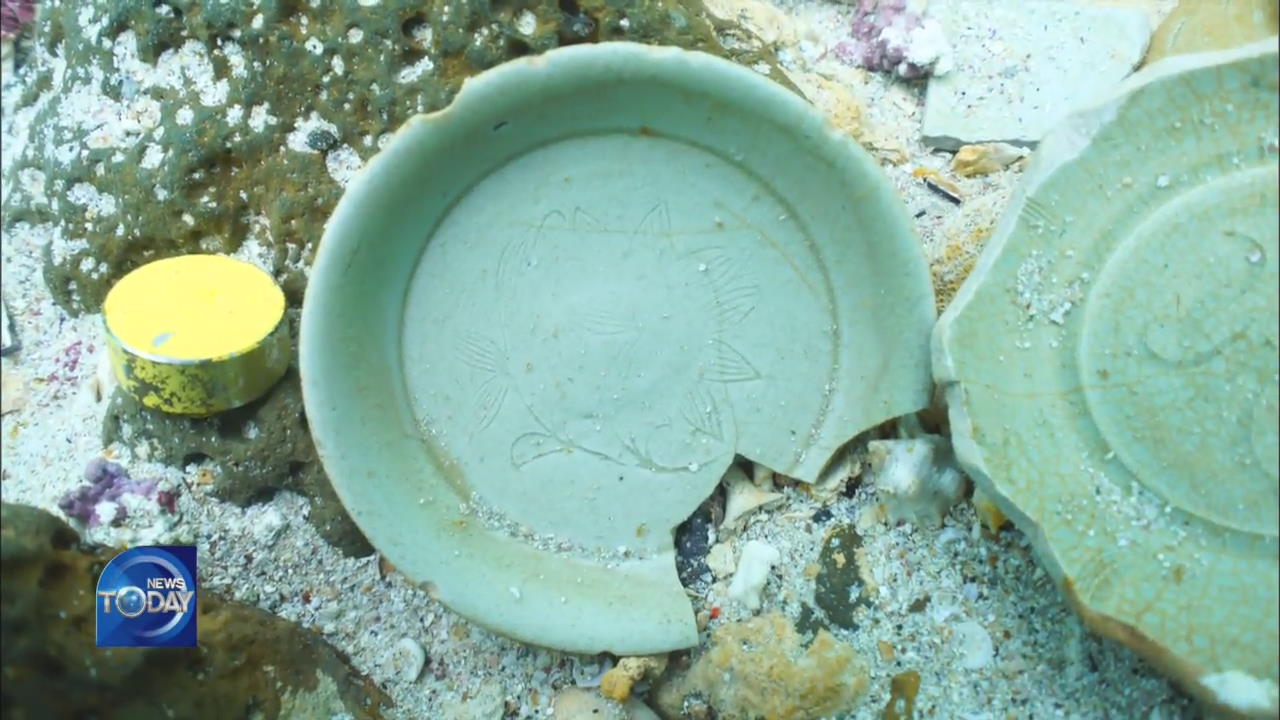DISCOVERY OF CHINESE RELICS IN KOREA
입력 2019.10.01 (15:34)
수정 2019.10.01 (16:45)
읽어주기 기능은 크롬기반의
브라우저에서만 사용하실 수 있습니다.
[Anchor Lead]
Some 400 pieces of relics of China's Southern Song Dynasty have been discovered in waters off Korea's southern Jejudo Island. Among the find is a seal and seal case used by Chinese merchants of that period, marking the first such discovery in Korea. The Cultural Heritage Administration believes a Chinese merchant vessel was shipwrecked in this area, serving as evidence to maritime exchanges held between Korea, China and Japan in those days.
[Pkg]
Waters off western Jejudo Island. As the sand is sucked out of the seabed, broken pottery pieces are revealed. An underwater excavation was carried out for 3 months since April and loads of earthenware fragments were found across a 300 square meter site. They are believed to date back to China's Southern Song Dynasty era. The Cultural Heritage Administration suspects a Chinese merchant vessel passing by Jeju-do on its way to Japan in the 12th or 13th century sunk in this area.
[Soundbite] LEE GWI-YOUNG(DIRECTOR-GENERAL, CHA) : "Southern Song era earthenware of the same pattern has been found in Korea as well as Japan. This proves trade existed between Southern Song, Goryeo and Japan."
A seal which Chinese merchants likely used in correspondence and packaging has also been found. It still had bits of red ink intact. There were also pieces of a seal case. Experts believe if seals of a similar design can also be located in China and Japan, that can help shed light on the identity of the sunken vessel. Underwater relics near Jeju-do's Sinchang-ri area were first reported to authorities in 1983 when a local female diver found a golden accessory. Last year, around 500 pieces of Southern Song era pottery were also discovered. The Cultural Heritage Administration believes there is more to be found in the waters in this area. Additional search and survey operations are being planned for next year.
Some 400 pieces of relics of China's Southern Song Dynasty have been discovered in waters off Korea's southern Jejudo Island. Among the find is a seal and seal case used by Chinese merchants of that period, marking the first such discovery in Korea. The Cultural Heritage Administration believes a Chinese merchant vessel was shipwrecked in this area, serving as evidence to maritime exchanges held between Korea, China and Japan in those days.
[Pkg]
Waters off western Jejudo Island. As the sand is sucked out of the seabed, broken pottery pieces are revealed. An underwater excavation was carried out for 3 months since April and loads of earthenware fragments were found across a 300 square meter site. They are believed to date back to China's Southern Song Dynasty era. The Cultural Heritage Administration suspects a Chinese merchant vessel passing by Jeju-do on its way to Japan in the 12th or 13th century sunk in this area.
[Soundbite] LEE GWI-YOUNG(DIRECTOR-GENERAL, CHA) : "Southern Song era earthenware of the same pattern has been found in Korea as well as Japan. This proves trade existed between Southern Song, Goryeo and Japan."
A seal which Chinese merchants likely used in correspondence and packaging has also been found. It still had bits of red ink intact. There were also pieces of a seal case. Experts believe if seals of a similar design can also be located in China and Japan, that can help shed light on the identity of the sunken vessel. Underwater relics near Jeju-do's Sinchang-ri area were first reported to authorities in 1983 when a local female diver found a golden accessory. Last year, around 500 pieces of Southern Song era pottery were also discovered. The Cultural Heritage Administration believes there is more to be found in the waters in this area. Additional search and survey operations are being planned for next year.
■ 제보하기
▷ 카카오톡 : 'KBS제보' 검색, 채널 추가
▷ 전화 : 02-781-1234, 4444
▷ 이메일 : kbs1234@kbs.co.kr
▷ 유튜브, 네이버, 카카오에서도 KBS뉴스를 구독해주세요!
- DISCOVERY OF CHINESE RELICS IN KOREA
-
- 입력 2019-10-01 15:41:04
- 수정2019-10-01 16:45:34

[Anchor Lead]
Some 400 pieces of relics of China's Southern Song Dynasty have been discovered in waters off Korea's southern Jejudo Island. Among the find is a seal and seal case used by Chinese merchants of that period, marking the first such discovery in Korea. The Cultural Heritage Administration believes a Chinese merchant vessel was shipwrecked in this area, serving as evidence to maritime exchanges held between Korea, China and Japan in those days.
[Pkg]
Waters off western Jejudo Island. As the sand is sucked out of the seabed, broken pottery pieces are revealed. An underwater excavation was carried out for 3 months since April and loads of earthenware fragments were found across a 300 square meter site. They are believed to date back to China's Southern Song Dynasty era. The Cultural Heritage Administration suspects a Chinese merchant vessel passing by Jeju-do on its way to Japan in the 12th or 13th century sunk in this area.
[Soundbite] LEE GWI-YOUNG(DIRECTOR-GENERAL, CHA) : "Southern Song era earthenware of the same pattern has been found in Korea as well as Japan. This proves trade existed between Southern Song, Goryeo and Japan."
A seal which Chinese merchants likely used in correspondence and packaging has also been found. It still had bits of red ink intact. There were also pieces of a seal case. Experts believe if seals of a similar design can also be located in China and Japan, that can help shed light on the identity of the sunken vessel. Underwater relics near Jeju-do's Sinchang-ri area were first reported to authorities in 1983 when a local female diver found a golden accessory. Last year, around 500 pieces of Southern Song era pottery were also discovered. The Cultural Heritage Administration believes there is more to be found in the waters in this area. Additional search and survey operations are being planned for next year.
Some 400 pieces of relics of China's Southern Song Dynasty have been discovered in waters off Korea's southern Jejudo Island. Among the find is a seal and seal case used by Chinese merchants of that period, marking the first such discovery in Korea. The Cultural Heritage Administration believes a Chinese merchant vessel was shipwrecked in this area, serving as evidence to maritime exchanges held between Korea, China and Japan in those days.
[Pkg]
Waters off western Jejudo Island. As the sand is sucked out of the seabed, broken pottery pieces are revealed. An underwater excavation was carried out for 3 months since April and loads of earthenware fragments were found across a 300 square meter site. They are believed to date back to China's Southern Song Dynasty era. The Cultural Heritage Administration suspects a Chinese merchant vessel passing by Jeju-do on its way to Japan in the 12th or 13th century sunk in this area.
[Soundbite] LEE GWI-YOUNG(DIRECTOR-GENERAL, CHA) : "Southern Song era earthenware of the same pattern has been found in Korea as well as Japan. This proves trade existed between Southern Song, Goryeo and Japan."
A seal which Chinese merchants likely used in correspondence and packaging has also been found. It still had bits of red ink intact. There were also pieces of a seal case. Experts believe if seals of a similar design can also be located in China and Japan, that can help shed light on the identity of the sunken vessel. Underwater relics near Jeju-do's Sinchang-ri area were first reported to authorities in 1983 when a local female diver found a golden accessory. Last year, around 500 pieces of Southern Song era pottery were also discovered. The Cultural Heritage Administration believes there is more to be found in the waters in this area. Additional search and survey operations are being planned for next year.
이 기사가 좋으셨다면
-
좋아요
0
-
응원해요
0
-
후속 원해요
0














![[단독] 경찰, 우리은행 부당대출 혐의 47억 원 추가 확인](/data/news/2025/07/02/20250702_RyG3im.jpg)


이 기사에 대한 의견을 남겨주세요.